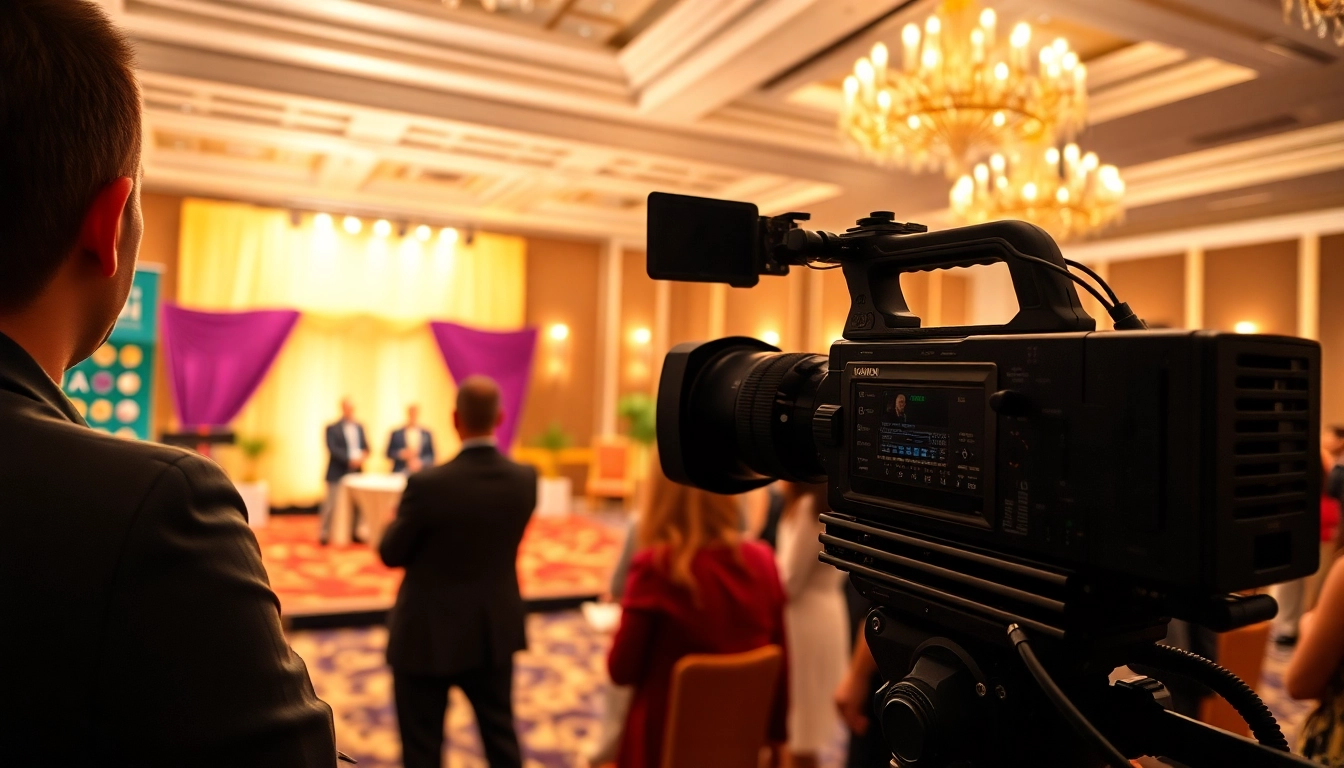
Understanding the Importance of Miami Corporate Event Videography Photography
In today’s fast-paced corporate landscape, visuals play an essential role in effectively conveying the essence of a brand and the vitality of its events. Miami, known for its vibrant culture and dynamic business scene, has become a hotspot for corporate gatherings. Utilizing Miami Corporate Event Videography Photography services can significantly enhance your event’s impact and reach. This article delves into the multifaceted benefits of videography and photography for corporate events in Miami, guiding you in making informed decisions for your future endeavors.
Why Video Content Matters for Your Events
Video content has emerged as a powerful tool in marketing and communication strategies. With the ability to convey messages succinctly and engagingly, video can capture audience attention far more effectively than static images or text alone. Engaging video content can enhance brand identity, influence audience perception, and ultimately drive higher attendance rates at corporate events.
Benefits of Professional Videography
- Enhanced Engagement: High-quality video captures the atmosphere of an event, offering viewers a taste of the experience, which can lead to increased interest in similar future events.
- Brand Storytelling: Videography enables brands to narrate their stories in a compelling manner, showcasing key moments, interviews, and highlights that emphasize their values and vision.
- Content Versatility: Video content can be repurposed across various platforms, including social media, websites, and newsletters, maximizing exposure and engagement.
- Improved Audience Reach: Videos can reach audiences beyond physical event locations, connecting with a larger demographic through online sharing and streaming.
Highlighting Key Moments: What to Capture
Incorporating videography into your corporate events means identifying and capturing crucial moments that convey the essence of the occasion. Key highlights might include:
- Opening speeches and presentations that set the tone for the event.
- Audience interactions, networking sessions, and attendee experiences that show engagement.
- Entertainment segments, performances, and celebrations that provide fun and excitement.
- Closing remarks and acknowledgments that summarize the event’s success.
Choosing a Videographer for Your Miami Corporate Event
When selecting a videographer for your corporate event, it’s crucial to look for a professional who understands your vision and can execute it effectively. Here are essential aspects to consider:
Essential Qualities of a Great Corporate Videographer
- Experience: Look for a videographer with a robust portfolio that showcases a variety of corporate event projects.
- Technical Proficiency: Ensure the videographer is adept at using modern videography equipment to produce high-quality footage.
- Creativity: A creative videographer can bring fresh ideas that enhance the storytelling aspect of your event.
- Professionalism: They should exhibit reliability, excellent communication, and a proactive attitude throughout the planning and execution phases.
Questions to Ask Before Hiring
To make an informed decision, consider asking the following questions when interviewing potential videographers:
- What types of corporate events have you covered in the past?
- Can you share examples of your previous work related to corporate events?
- What equipment do you use, and are you equipped for various lighting conditions?
- What is your approach to editing and post-production, and how long does it take to deliver the final product?
Understanding Pricing Models and Packages
Different videographers may offer varying pricing models, including package deals or hourly rates. It’s essential to understand what each package includes, such as the number of videographers, hours of coverage, editing services, and delivery formats. Always verify that the offered services align with your needs and budget to ensure a satisfactory outcome.
Planning Your Miami Corporate Event Videography Photography
Successful event coverage requires meticulous planning and collaboration with your chosen videographer. Here are key aspects to ensure a smooth process:
Pre-Event Preparation: What You Need to Do
Preparation involves more than just hiring a videographer. It includes:
- Defining Objectives: Clarifying the purpose of the video helps shape the overall strategy.
- Timeline Creation: Developing a timeline of event activities aids your videographer in understanding when to be ready for specific shots.
- Logistics Coordination: Make arrangements for location access, power supply, and any permissions needed for filming.
Collaborating with Your Videographer
Collaboration is critical in ensuring that both you and the videographer share a common vision. Arrange a pre-event meeting to discuss:
- Your goals for the video and specific moments you want captured.
- Any logistical considerations such as event flow and guest availability for interviews.
- Creative ideas like theme colors or branding that should be reflected in the footage.
Creating a Shot List for Optimal Coverage
A shot list clarifies essential scenes and moments to capture during the event. Work with your videographer to create a list that includes:
- Key note presentations and speeches.
- Networking or mingling opportunities among guests.
- Specific activities or demonstrations you want highlighted.
Technical Aspects of Corporate Event Videography in Miami
Understanding the technical side of videography can help you appreciate the artistry behind the final product. Here are a few vital technical elements to consider:
Equipment and Technology Used in Videography
Professional videographers utilize a range of high-quality equipment to deliver stunning results:
- Cameras: They often use high-definition cameras with various lenses to capture different angles and perspectives.
- Stabilization Gear: Equipment like gimbals and steadicams ensure smooth footage, even during dynamic shots.
- Audio Equipment: Quality microphones and sound recording devices are crucial for capturing clear audio during speeches and interviews.
Understanding Video Formats and Resolutions
Familiarity with video formats is essential for determining the best delivery options for your needs. Common formats include:
- MP4: This versatile format is suitable for online sharing and playback across devices.
- AVI: A higher-quality format that may be preferred for archival purposes.
- 1080p and 4K Resolutions: Higher resolutions provide crisper images, especially when showcased on large screens.
Editing and Post-Production: What to Expect
The post-production phase is where the magic happens. It’s vital to allow adequate time for editing, which may involve:
- Color correction to enhance the visual appeal.
- Creating transitions and special effects that elevate the story.
- Incorporating background music and sound effects for a polished finish.
Maximizing Exposure with Your Corporate Event Video
Once your corporate event video is complete, the next step is optimizing its reach and effectiveness. Here’s how you can maximize exposure:
Sharing vs. Archiving: Making the Most of Your Content
Decide how to utilize your event footage for long-term benefits. Strategies include:
- Sharing: Distributing the video across social media platforms to engage with both attendees and non-attendees.
- Archiving: Storing footage for documentation and potential use in future marketing materials.
Best Platforms for Distributing Your Event Video
Choosing the right platforms for video distribution is crucial to ensuring maximum reach:
- YouTube: A robust platform for hosting videos with SEO benefits, which can increase visibility.
- LinkedIn: Ideal for targeting professionals and sharing corporate content effectively.
- Company Website: Featuring the video on your site enhances credibility and can drive traffic.
Measuring the Impact: Analytics and Feedback
To gauge the success of your video, utilize analytics tools available on most platforms:
- Monitor views, engagement rates, and shares to assess popularity.
- Collect qualitative feedback from viewers to identify strengths and areas for improvement.






